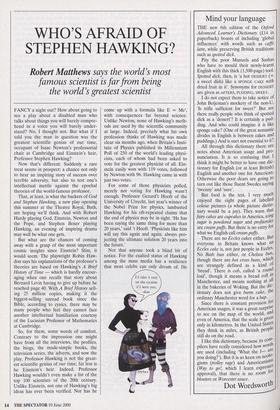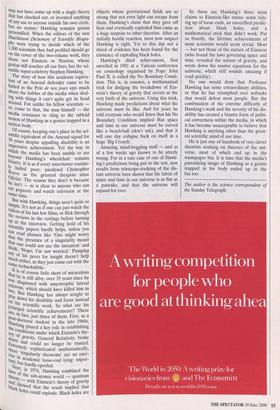WHO'S AFRAID OF STEPHEN HAWKING?
Robert Matthews says the world's most
famous scientist is far from being the world's greatest scientist
FANCY a night out? How about going to see a play about a disabled man who talks about things you will barely compre- hend in a voice you will barely under- stand? No, I thought not. But what if I told you the man in question was the greatest scientific genius of our time, occupant of Isaac Newton's professorial chair at Cambridge and Einstein's heir, Professor Stephen Hawking?
Now that's different. Suddenly a rare treat seems in prospect: a chance not only to hear an inspiring story of success over terrible adversity, but also to test one's intellectual mettle against the epochal theories of the world-famous professor.
That, at least, is what the backers of God and Stephen Hawking, a new play opening this summer at the Theatre Royal, Bath, are hoping we'll think. And with Robert Hardy playing God, Einstein, Newton and the Pope, and Stephen Boxer playing Hawking, an evening of inspiring drama may well be what one gets.
But what are the chances of coming away with a grasp of the most important cosmic insights since Einstein? Slim, it would seem. The playwright Robin Haw- don says his explanations of the professor's theories are based on Hawking's A Brief History of Time — which is hardly encour- aging when one recalls that story about Bernard Levin having to give up before he reached page 40. With A Brief History sell- ing 25 million copies, making it the biggest-selling unread book since the Bible, according to cynics, there may be many people who feel they cannot face another intellectual humiliation courtesy of the Lucasian Professor of Mathematics at Cambridge.
So, for them, some words of comfort. Contrary to the impression one might have from all the interviews, the profiles, the biogs, the made-simple books, the television series, the adverts, and now the play, Professor Hawking is not the great- est scientific genius of our time; far less is he Einstein's heir. Indeed, Professor Hawking wouldn't even make a list of the top 100 scientists of the 20th century. Unlike Einstein, not one of Hawking's big ideas has ever been verified. Nor has he come up with a formula like E = Mc', with consequences far beyond science. Unlike Newton, none of Hawking's meth- ods are used by the scientific community at large. Indeed, precisely what his own profession thinks of Hawking was made clear six months ago, when Britain's Insti- tute of Physics published its Millennium Poll of 250 of the world's leading physi- cists, each of whom had been asked to vote for the greatest physicist of all. Ein- stein easily won with 119 votes, followed by Newton with 96. Hawking came in with just two votes.
For some of those physicists polled, merely not voting for Hawking wasn't enough. Professor Gerard't Hooft of the University of Utrecht, last year's winner of the Nobel Prize for physics, lambasted Hawking for his oft-repeated claims that the end of physics may be in sight. 'He has been saying the same thing for more than 20 years,' said 't Hooft. 'Physicists like him will say this again and again, always pro- jecting the ultimate solution 20 years into the future.'
Not that anyone took a blind bit of notice. For the exalted status of Hawking among the mass media has a resilience that most celebs can only dream of. He may not have come up with a single theory that has checked out, or invented anything of any use to anyone outside his own circle, but no matter: Hawking remains genius personified. When the editors of the new Hutchinson Dictionary of Scientific Biogra- phy were trying to decide which of the 1,300 scientists they had profiled should go on the cover of the two-volume work, they chose not Einstein or Newton, whose genius still touches all our lives, but the sci- entific super-celebrity Stephen Hawking. The story of how this academic equiva- lent of an Arsenal defender came to be hailed as the Pele de nos jours says much about the foibles of the media when deal- ing with things it can't quite get its head around. For unlike his fellow scientists or, come to that, the man himself — the media continues to cling to the tabloid notion of Hawking as a genius trapped in a useless body. Of course, keeping one's place in the sci- entific equivalent of the Arsenal squad for 30 years despite appalling disability is an impressive achievement. Yet the way in which the media has been unable to see beYond Hawking's wheelchair remains bizarre. It is as if every interviewer routine- 1Y hailed poor, paralysed Christopher Reeve as the greatest thespian since Olivier. The reason they don't is because he isn't — as is clear to anyone who can eat Popcorn and watch television at the same time. But with Hawking, things aren't quite so simple. It's not as if one can just watch the videos of his last few films, or flick through the reviews in the cuttings before turning P at the interview. Getting hold of his scientific papers hardly helps, unless you can read phrases like 'One might worry that the presence of a singularity meant that one could not use the instanton' and t hulk `Nope, I'm not worried.' Pumping any of his peers for insight doesn't help much either, as they just come out with the same technobabble. It is of course little short of miraculous that he is still alive, over 35 years since he ae,,was diagnosed with amyotrophic lateral .._lerosjs, which should have killed him in e. But Hawking has always sought to Play down his disability and focus instead ue his scientific work. So what are his Principal scientific achievements? There are, in fact, just three of them. First, as a Post-doctoral student in the late 1960s, Hawking played a key role in establishing the Conditions under which Einstein's the- doof gravity, General Relativity, broke wn and could no longer be trusted. Witetreinely sophisticated mathematically, e. 'singularity theorems' are an exer- t_ in academic loose-end 41INt, but hardly epochal. tying: impor- iawsexl, in 1974, Hawking combined the of the sub-atomic world — quantum theo — with Einstein's theory and sho of gravity black wed that the result implied that holes could explode. Black holes are objects whose gravitational fields are so strong that not even light can escape from them. Hawking's claim that they gave off heat and eventually exploded thus came as a huge surprise to other theorists. After an initially hostile reaction, most now suspect Hawking is right. Yet to this day not a shred of evidence has been found for the existence of exploding black holes.
Hawking's third achievement, first unveiled in 1981 at a Vatican conference on cosmology organised by Pope John Paul II, is called the No Boundary Condi- tion. This is, in essence, a mathematical trick for dodging the breakdown of Ein- stein's theory of gravity that occurs at the very birth of the universe. Using this trick, Hawking made predictions about what the universe must be like. And for years he told everyone who would listen that his No Boundary Condition implied that space and time in our universe must be curved like a beach-ball (don't ask), and that it will one day collapse back on itself in a huge 'Big Crunch'. Amazing, mind-boggling stuff — and as of a few weeks ago known to be utterly wrong. For in a rare case of one of Hawk- ing's predictions being put to the test, new results from telescope-studying of the dis- tant universe have shown that the fabric of space and time in our universe is as flat as a pancake, and that the universe will expand for ever. So these are Hawking's three main claims to Einstein-like status: some tidy- ing up of loose ends, an unverified predic- tion about black holes, and a mathematical trick that didn't work. Put so bluntly, the lifetime achievements of most scientists would seem trivial. Most — but not those of the stature of Einstein (who found the laws governing space and time, revealed the nature of gravity, and wrote down the master equations for the universe, which still sounds amazing if read quickly).
No one would deny that Professor Hawking has some extraordinary abilities, or that he has triumphed over setbacks that would defeat most people. But the combination of the extreme difficulty of Hawking's work and the severity of his dis- ability has created a bizarre form of politi- cal correctness within the media, in which it has become unacceptable to believe that Hawking is anything other than the great- est scientific mind of our time.
He is just one of hundreds of very clever theorists working on theories of the uni- verse, most of which end up in the wastepaper bin. It is time that the media's patronising image of Hawking as a genius trapped in his body ended up in the bin too.
The author is the science correspondent of the Sunday Telegraph.

































































 Previous page
Previous page